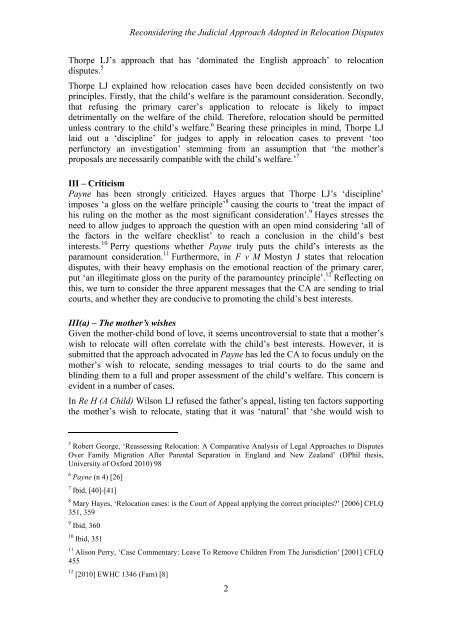Open UKLSR Volume 1(2) - Uklsa
Open UKLSR Volume 1(2) - Uklsa
Open UKLSR Volume 1(2) - Uklsa
You also want an ePaper? Increase the reach of your titles
YUMPU automatically turns print PDFs into web optimized ePapers that Google loves.
Reconsidering the Judicial Approach Adopted in Relocation Disputes<br />
Thorpe LJ’s approach that has ‘dominated the English approach’ to relocation<br />
disputes. 5<br />
Thorpe LJ explained how relocation cases have been decided consistently on two<br />
principles. Firstly, that the child’s welfare is the paramount consideration. Secondly,<br />
that refusing the primary carer’s application to relocate is likely to impact<br />
detrimentally on the welfare of the child. Therefore, relocation should be permitted<br />
unless contrary to the child’s welfare. 6 Bearing these principles in mind, Thorpe LJ<br />
laid out a ‘discipline’ for judges to apply in relocation cases to prevent ‘too<br />
perfunctory an investigation’ stemming from an assumption that ‘the mother’s<br />
proposals are necessarily compatible with the child’s welfare.’ 7<br />
III – Criticism<br />
Payne has been strongly criticized. Hayes argues that Thorpe LJ’s ‘discipline’<br />
imposes ‘a gloss on the welfare principle’ 8 causing the courts to ‘treat the impact of<br />
his ruling on the mother as the most significant consideration’. 9 Hayes stresses the<br />
need to allow judges to approach the question with an open mind considering ‘all of<br />
the factors in the welfare checklist’ to reach a conclusion in the child’s best<br />
interests. 10 Perry questions whether Payne truly puts the child’s interests as the<br />
paramount consideration. 11 Furthermore, in F v M Mostyn J states that relocation<br />
disputes, with their heavy emphasis on the emotional reaction of the primary carer,<br />
put ‘an illegitimate gloss on the purity of the paramountcy principle’. 12 Reflecting on<br />
this, we turn to consider the three apparent messages that the CA are sending to trial<br />
courts, and whether they are conducive to promoting the child’s best interests.<br />
III(a) – The mother’s wishes<br />
Given the mother-child bond of love, it seems uncontroversial to state that a mother’s<br />
wish to relocate will often correlate with the child’s best interests. However, it is<br />
submitted that the approach advocated in Payne has led the CA to focus unduly on the<br />
mother’s wish to relocate, sending messages to trial courts to do the same and<br />
blinding them to a full and proper assessment of the child’s welfare. This concern is<br />
evident in a number of cases.<br />
In Re H (A Child) Wilson LJ refused the father’s appeal, listing ten factors supporting<br />
the mother’s wish to relocate, stating that it was ‘natural’ that ‘she would wish to<br />
5 Robert George, ‘Reassessing Relocation: A Comparative Analysis of Legal Approaches to Disputes<br />
Over Family Migration After Parental Separation in England and New Zealand’ (DPhil thesis,<br />
University of Oxford 2010) 98<br />
6 Payne (n 4) [26]<br />
7 Ibid, [40]-[41]<br />
8 Mary Hayes, ‘Relocation cases: is the Court of Appeal applying the correct principles?’ [2006] CFLQ<br />
351, 359<br />
9 Ibid, 360<br />
10 Ibid, 351<br />
11 Alison Perry, ‘Case Commentary: Leave To Remove Children From The Jurisdiction’ [2001] CFLQ<br />
455<br />
12 [2010] EWHC 1346 (Fam) [8]<br />
2


